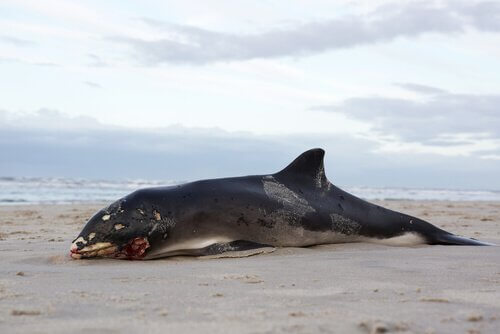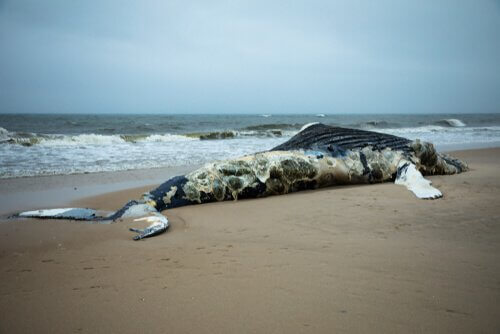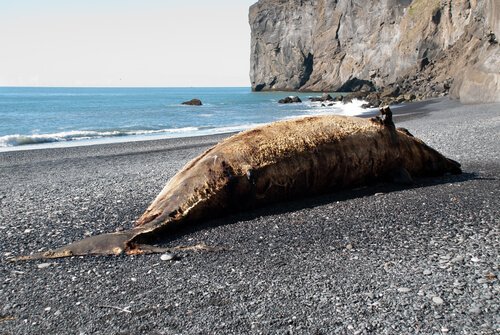Why Do Whales Explode After Dying?

It doesn’t happen with every whale, but several cases are on record where whales explode after dying. In this article, we’ll tell you about this weird phenomena that has caught the attention of both researchers and passers-by.
Why do whales end up stranded on the beach?
Cetacean stranding, commonly known as beaching, is one of the causes of death of these giant ocean mammals. This is nothing new, for there are records of stranded whales going back centuries. In many cases, they choose to strand themselves on land when they’re sick or very old.
This may also happen if for some reason they become disorientated. For instance, after colliding with a set of rocks or when trying to flee from some danger offshore. They usually end up on the coast, where they can’t escape and eventually die.
We must also add that there are other reasons for whale stranding. Sadly, they are reasons that humans are completely responsible for. For example, pollution in the oceans has changed the color, temperature, and appearance of the waters.
In addition, due to global warming, the coldest areas of the planet such as the North and South Poles are disappearing, and the whales no longer know where to go at certain times of the year.

Why do whales explode when they die?
Experts have documented this phenomenon on several occasions and in different areas of the world. It’s not an isolated case nor is it something purely ‘accidental’. To explain this, we should know that when a living being dies, a part of its body is still alive.
We’re talking here about the digestive system. The stomach and intestines don’t ‘know’ that the organism has died and continue to work with what’s left in the body.
For this reason, there’s an accumulation of different gases such as hydrogen sulfide and methane. In addition, due to the body’s decomposition process, a microbial reproduction ends up producing a massive swelling and, often, an explosion.
This isn’t to say that all whales that die stranded on the coasts will explode. Actually, there are several conditions that must come together.
For example, the type of bacteria in the animal’s stomach, the cause of death, what kinds of food it’s eaten in the last few days, injuries, and weather conditions. High temperatures are likely to produce more gas compared to low temperatures.
We also must bear in mind that the swollen, rotting body of a whale that gets stranded on the coast can undergo what is known as a ‘mechanical stress’. This often happens when people attempt to remove the dead body with a crane.
At that moment, the gases and liquids inside the body exert pressure against the stomach walls. This can lead to an explosion and expulsion of all the rotten content.

“Famous” examples of exploding whales
If we look for cases where whales have exploded in the past, we’re bound to come across what happened in Oregon, United States, in the 70s. In this case, the explosion wasn’t natural: experts decided to place dynamite inside the corpse in order to remove it from the coast.
We could also mention what happened in Tainan, Taiwan. In 2004, the accumulation of gases inside a 56 feet long, 50-ton sperm whale in decomposition caused a massive explosion.
The explosion splashed guts and blood on all the passers-by, shops, cars, and surrounding streets. The witnesses commented on the foul smell and disgusting entrails.
A local channel documented something similar that happened on the Faroe Islands in 2013. When an operator attempted to manipulate the body of a dead marine mammal on the shore, it exploded due to the accumulation of gas in its stomach.
In places where it’s common for whales and cetaceans to end up stranded, people usually make a cut in the dead animal’s belly to avoid this rather disgusting chain of events. The downside about this practice is that the expulsion of internal fluids attracts birds and even sharks that come very close to the shore.
All cited sources were thoroughly reviewed by our team to ensure their quality, reliability, currency, and validity. The bibliography of this article was considered reliable and of academic or scientific accuracy.
Ketten, D. R., Lien, J., & Todd, S. (1993). Blast injury in humpback whale ears: Evidence and implications. The Journal of the Acoustical Society of America. https://doi.org/10.1121/1.407688